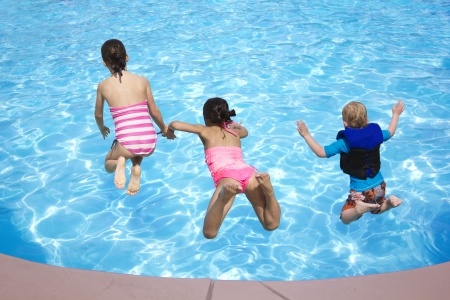Preventing Swimming Pool/Spa Accidents
June 13, 2014 | Category: Swimming Accidents | Share According to the CPSC (Consumer Product Safety Commission), approximately 300 children under the age of 5 die every year as a result of drowning, and more than 2,000 are sent to the hospital. About 65% of these accidents occurred in pools owned by the child's own family.
According to the CPSC (Consumer Product Safety Commission), approximately 300 children under the age of 5 die every year as a result of drowning, and more than 2,000 are sent to the hospital. About 65% of these accidents occurred in pools owned by the child's own family.
The first line of defense for pool owners is a properly constructed fence or barrier to the pool, or spa. The Florida Residential Pool Safety Act of 2000 requires that owners of private pools take care to secure the pools and spas with fences or some sort of enclosures designed to keep children away. A pool owner could be legally liable for injuries sustained from a pool if there were no barriers to keep children from entering the pool area.
Pool/spa owners, having doors and windows which provide direct access to the pool and/or spa, should have them equipped with exit alarms which have minimum sound pressures of 85 dB A at 10 feet.
Former U.S. Consumer Product Safety Commission Chair, Ann Brown said, "Drowning happens quickly and silently, often without any splashing or screaming. It can occur in just the couple of minutes it takes to answer the telephone."
Pool/spa drains may also be hazardous. The suction can be so powerful that it can hold an adult, or child, under water, and hair can be pulled in and tangled in the drain. Many pool and spa owners install back-up systems that detect when drains are blocked and automatically shuts off pool pumps or interrupts the water circulation to prevent entrapments.
According to the CPSC electric shock incidents involving underwater pool lighting and circuits are more numerous than those involving any other consumer product used in or around pools, spas, and hot tubs. Four Miami children were shocked by electricity, and one died, in the past month while swimming due to faulty wiring. According to an electrician who inspected the pool equipment at the home of a child who died as a result of electric shock, a ground wire was not attached to the transformer allowing 120 volts of electricity to be sent to the pool light. The current corroded the light’s steel casing, and soon, water seeped in, creating an electrically charged body of water.
Here are some tips to prevent swimming pool accidents from Consumer Affairs:
- Fences and walls -- Should be at least 4 feet high and installed completely around the pool. Fence gates should be self-closing and self-latching.
- Power safety covers -- A motor-powered barrier that can be placed over the water area should be used when the pool is not in use.
- For above-ground pools, steps and ladders to the pool should be secured and locked, or removed when the pool is not in use.
- Check to make sure the drain covers are in place and undamaged.
- Check for corrosion around pool lights and electrical fixtures in the pool area. If detected, make sure to have a licensed electrician perform any electric work
- If a child is missing, always look in the pool first. Seconds count in preventing death or disability.
Attorney Randall Spivey of Spivey Law Firm, Personal Injury Attorneys says, "Injuries or death involving swimming accidents can occur due to improper supervision, dangerous or defective drains in pools, the lack of child safety fences or audible alarms, and the failure to warn about the dangers of the pool, which may include the failure to provide a lifeguard or inadequate warnings as to the depth of the water. When residential pool owners fail to take basic safety precautions, they may be liable for any accidents that result in injuries or deaths. Likewise, when hotels or beach owners fail to post adequate signage warning of dangerous conditions, such as a strong undertow or tide, a lack of a lifeguard or other adult supervision, and/or appropriate water depth notifications, these entities also may have liability for accidents that result in injuries or deaths."
Fort Myers Swimming Accident Attorney, Randall L. Spivey is a Board Certified Trial Attorney – the highest recognition for competence bestowed by the Florida Bar and a distinction earned by just one (1%) percent of Florida attorneys. He has handled over 2,000 personal injury and wrongful death cases throughout Florida. For a free and confidential consultation to discuss your legal rights, contact the Spivey Law Firm, Personal Injury Attorneys, P.A., in Lee County at 239.337.7483 or toll free at 1.888.477.4839,or by email to Randall@SpiveyLaw.com. Visit SpiveyLaw.com for more information. You can contact Spivey Law Firm, Personal Injury Attorneys, P.A.in Charlotte County at 941.764.7748 and in Collier County 239.793.7748.

